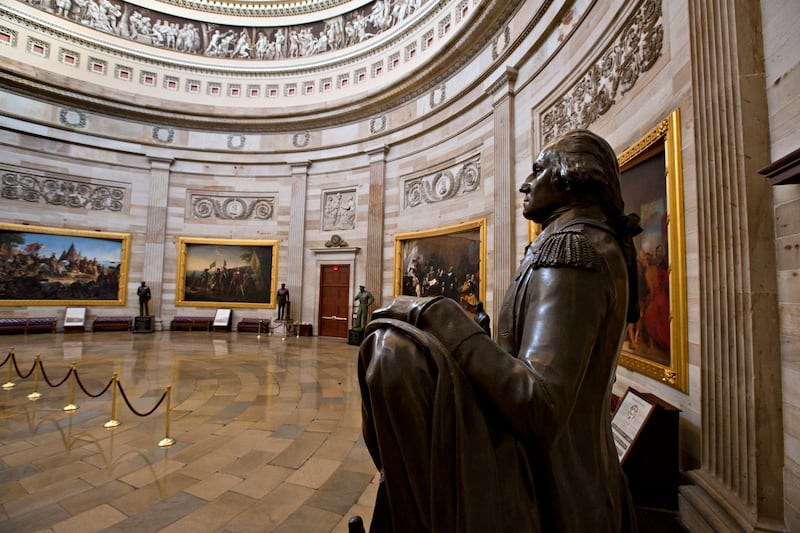George Washington’s “Farewell Address” — the 1796 sendoff in which he announced his retirement from the presidency and offered parting counsel to the American people — is justly famous. It ranks as one of our greatest state papers. It belongs to the canon of American literature. It rewards repeated rereading. It is, or once was, familiar to most civically literate Americans.
What is less known is that Washington’s great political sermon was actually his second valediction. Like other impressive Americans — think Tom Brady or Michael Jordan —Washington retired more than once. And on his first retirement, when he surrendered command of the Continental Army in 1783, Washington penned a farewell message intended to guide his country on the tumultuous journey from hard-won independence to stable and prosperous self-governance.
This farewell “Circular to the States” became, along with the Declaration of Independence, the most famous political document of the era. It was printed and reprinted everywhere. Americans of the 1780s and 1790s knew it, and prized it, as “Washington’s Legacy.”
From the vantage of the 2020s, this 240-year-old document is astonishingly prescient, pertinent and poignant. As his final bequest to the American people, Washington — who did not intend to return to public life — inscribed for posterity what he took to be the central lesson of the Revolutionary War: namely, that the newly independent nation would remain independent only if it grew strong, and it would grow strong only if it became more united.
Unity, then, was Washington’s watchword. He believed there could be neither freedom nor prosperity without it. His message bears revisiting today.
Washington’s first charge was constitutional. He called for “an indissoluble union of the states under one federal head.” From the beginning of the war to its end, Washington had been hamstrung by a hydra-headed monster of decentralized governance. To get anything done, he had to coordinate not only with an ephemeral Congress whose headquarters fled before the advancing British army — and whose members often abandoned those headquarters for the greener pastures of state politics — but also with 13 different state governors and as many state legislatures, all of them touchily jealous of their own prerogatives and powers.
The upshot was a Sisyphean nightmare of struggling to keep men in the field with shoes on their feet, shirts on their back, food in their bellies, and guns in their hands. Congress might beg the states for additional support, but the states were free to comply or not as they saw fit. Congress might cajole, but it could never compel.
In Washington’s view, this situation was unsustainable. The nation needed a strong central authority. “It is indispensable to the happiness of the individual states,” Washington wrote, “that there should be lodged somewhere a supreme power to regulate and govern the general concerns of the confederated Republic.”
Without such a power, he warned, “the Union cannot be of long duration.” In hindsight, these words plainly anticipate the crises of the mid-1780s and the Constitutional Convention — presided over by Washington himself — to which they led.
But Washington’s bigger concern was cultural as well as constitutional. He inveighed against “a spirit of disunion or a temper of obstinacy” among the American people. Indeed, Washington felt so strongly about the need for national unity and citizen harmony that he closed his remarks on this topic with a prayer — a heartfelt benediction on the people he had served.
Washington was a man of deep faith, but he was not conventionally religious. His church attendance was uneven, and his public expressions of faith tended to be generic and ecumenical. To be sure, his commitment to religious liberty was total: as president of the Continental Convention, he made a point of attending a Catholic Mass, and as president of the new nation, he promised to safeguard the rights of America’s Jews. But his public religious expression was usually restrained and lacked any specifically Christian character.
Washington’s 1783 farewell message is exceptional in this regard, and therefore all the more striking. “I now make it my earnest prayer,” the general concluded, “that God would have you ... in his holy protection, and that he would incline the hearts of the citizens ... to entertain a brotherly affection and love for one another, for their fellow citizens of the United States.”
Washington prayed further that God would “dispose us all to do justice, to love mercy, and to demean ourselves with that charity, humility, and pacific temper of mind which were the characteristics of the Divine Author of our blessed religion.” Without imitating Jesus Christ’s example in these things, Washington admonished, “we can never hope to be a happy nation.”
This was Washington’s farewell counsel to the American people in 1783. We would do well to heed it in 2023. In an age of almost unprecedented polarization — a season of escalating rhetorical nastiness and collapsing political norms — perhaps we can revive the retiring soldier’s call for “brotherly affection and love.” Perhaps we can embrace anew his summons to justice and mercy, humility and civic charity. Perhaps, at a time when Washington’s own historical standing is fiercely contested, we can unite at least on this portion of his legacy.
Fourscore years after Washington’s first farewell, another great president, whom we also honor this weekend, spoke eloquently and unforgettably of liberty and equality as our nation’s founding and grounding ideals. But Abraham Lincoln understood, like Washington before him, that none of our ideals can “long endure” without an antecedent foundation of unity. Without unity, as Washington warned — and without the dispositions of mind and habits of heart that foster it— “we can never hope to be a happy nation.”
Justin Collings is a law professor at Brigham Young University and a scholar at the Wheatley Institute.


